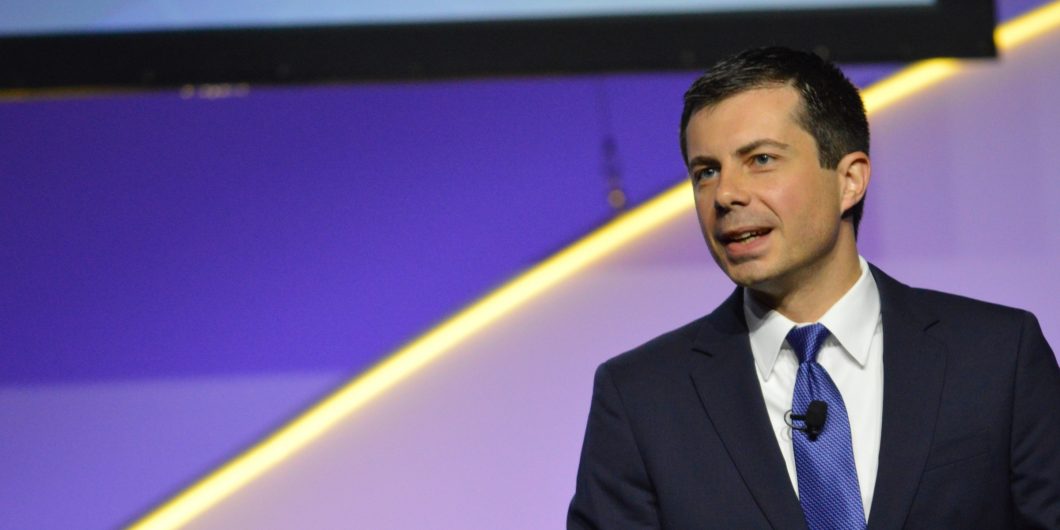Trusting Mayor Pete
His inaugural speech was all about unity. They were conventional sentiments, which would have been immediately forgettable, had the need for them not been so acute. After a difficult year, a bitterly contested election, and an outbreak of mob violence within the Capitol itself, conventional platitudes could feel genuinely inspired. Of course, no sensible person really believes that our 46th president has the wherewithal to broker a peace in America’s raging culture wars.
Joe Biden is an old man, stepping into the shoes of another old man. We are determined, it seems, to be ruled by old men, perhaps in part because our nation has become so intensely polarized that “consensus candidates” are difficult to find among the young. Elderly politicians had the opportunity to build name recognition in a more normal era, when political rivals were at least somewhat able to set business aside while they went for a drink. For younger politicians, it has been difficult to break into the ranks of the political elite without courting support from one or another camp of ideological zealots. As common ground dwindles, gerontocracy rises, because elderly candidates are the only ones who seem sufficiently electable. This trend does not bode well for the future.
An Electable Moderate?
Young moderates should excite our interest in such a moment. Populist base-beating has grown boring and predictable. Anything, it seems, can inflame political passions nowadays. Moderates are the ones who are truly running the political gauntlet in our time, weighing each word and gingerly turning each phrase, endlessly striving to hit the sweet spot between “inflammatory” and “milquetoast.”
On the right, we can see Marco Rubio and Nikki Haley reaching for the moderate mantle. On the left, there is Pete Buttigieg, the 39-year-old wunderkind from South Bend, IN. His new book, Trust, is obviously meant to bolster his credentials as a left-leaning moderate. It is boring, like most books (ostensibly) authored by politicians. Even so, it offers some clues as to Buttigieg’s suitability for the role he obviously aspires to: that of the moderate consensus candidate.
Buttigieg emerged as a surprise sensation in the 2020 Democratic primaries. In an absurdly overcrowded field of contenders, he somehow managed to be a serious contender, shocking everyone with a big win in Iowa. Some Americans found it difficult to take him seriously. On a stage with other Democratic contenders, he seemed like someone’s wonky little brother. His profile was intriguingly outside-the-box, however. He was Harvard-educated, but had also served in the military. He was a white man from a privileged background, but also the mayor of a Midwestern town. He went to church, but he was gay. And he came out of nowhere. Who had even heard of Pete Buttigieg prior to 2019?
I, for one, had heard of him. I personally knew Buttigieg two decades ago, as an undergraduate at Notre Dame. I took a class with his mother, and on the weekends I would sometimes see him at my parents’ house, because he was a high school friend of my sister’s. Some things change over the years: He went by “Peter” back then, and he had not yet come out as gay. Many things stay the same though. The Peter I recall was earnest, ambitious, and well-spoken. Those still seem to be among his most defining traits. He still affects a kind of eagerness to please, which is genteel but also feels slightly obsequious. He was self-possessed, and his sense of humor was dry. I remember him stepping into the entryway of my parents’ house one Sunday afternoon, remarking with a bemused expression, “You know, it seems like every time I come here, your family is gathered around the piano singing hymns of praise to God.”
Within the Biden Administration, Buttigieg will be 14th in line for the presidency as the new transportation secretary. It seems quite possible that he could serve the rest of his life as some sort of party functionary, which might really be optimal for his health and personal happiness. Undoubtedly though, he still thirsts for presidential glory. It’s possible that ambition might press him into giving up on his image moderation, aligning himself instead with one or another camp of populist zealots. That certainly would be the easiest way to climb the crag.
To survive as a moderate in our time, you have to be tough as nails. If you can’t take a stand against your own party’s extremists, you might as well be one.
Obama never got past his deeply patronizing “god and guns” view of America’s other half. Buttigieg could easily end up in a similar place, and if that happens, his success in healing division will probably mirror Obama’s.
It is just possible, however, that Buttigieg might succeed, emerging from the cesspool of contemporary politics as an electable moderate. He won’t have my vote, but I would not necessarily be sorry to see this happen. That isn’t only because I remember his parents with some measure of fondness. It’s also because I believe that Buttigieg is by nature a compromiser more than a zealot. He likes it when people get along. Also, his background gives him at least some framework for understanding the sorts of compromises that would be needed to help Americans find that badly-needed solidarity. Buttigieg is very much a creature of the left, but he isn’t per se repulsed by Mormon families gathered around a piano, singing hymns of praise to God.
Trust We Can Believe In
Very little of this makes its way to the pages of Trust. For the most part, the book is run-of-the-mill leftist pabulum, with plenty of minor provocations for the conservative reader. We hear a lot about structural racism, #metoo, and the scourge of Republican “voter suppression.” Several pages are devoted to a sophomoric dismissal of small-government conservatism. (Why, Buttigieg wonders, would a strong leader like Ronald Reagan set himself against big government? It’s a mystery.) Right-wing conspiracy theorists, neo-conservative warmongers, and climate denialists are all duly taken to task. One particularly weird passage airs the possibility that America may need a “truth and reconciliation” process to recover from the Trump Administration, similar to what countries like Rwanda have used to facilitate social healing following genocidal violence. It is amusing indeed to imagine Buttigieg in a room full of MAGA conservatives, trying to start the sharing circle.
It’s all quite silly, but there is little point in being irritated. Books like this are the political theorist’s equivalent of hotel-room décor. They are supposed to read like a well-honed College Democrat manifesto, enabling already-sympathetic readers to traipse from cover to cover without feeling challenged or uncomfortable in any way. An interesting book, which meaningfully contributed to an ongoing conversation, would inevitably offend some segment of readers. For an aspiring moderate, few things could be worse.
In short, this book is not worth reading if your goal is to learn more about restoring trust in America. Even so, it is somewhat noteworthy that Buttigieg chose this topic for his anodyne political tract. It is at this point a widely recognized fact that trust is a disappearing commodity in our nation, especially among the young. We don’t trust our fellow citizens as much as we used to, and we trust our leaders and institutions even less. This is a real problem. Trust is a necessary precondition for virtually any productive cooperative activity. It also contributes massively to individual health and happiness. No one wants to live in a world where everyone seems to be out to get them. Beyond that, we live in a massively complex society in which we constantly rely on people we have never met to handle our food or medication properly, to secure our utilities and financial records, and to keep our bridges from falling down. Without trust, life in such a world is simply miserable. We can hardly avoid becoming paranoid and embittered.
Trust won’t make any progress in restoring America’s trust, given how much blame it heaps on the political right. Still, it’s something that Buttigieg’s broad-spectrum diagnosis of our society’s ills focuses primarily on polarization itself, instead of fuming about the contemptible revanchism of Trumpian deplorables. In itself, that will not be enough to broker meaningful compromise. Barack Obama sometimes offered the political right rhetorical gestures in the guise of an olive branch, but he never got past his deeply patronizing “god and guns” view of America’s other half. Buttigieg could easily end up in a similar place, and if that happens, his success in healing division will probably mirror Obama’s.
I can still see a few reasons to hope for better. Buttigieg isn’t as fresh-faced now as the Peter I remember, but he is still young, with time to nuance his perspective. Already, his background gives him advantages over most other Democratic politicians. His father, a Maltese-American Marxist from a large Catholic family, had complex views on religion, but the roots clearly ran deep. It is interesting indeed that Buttigieg himself chose to serve in the American military, which is by no means a typical ladder-climbing move for an aspiring Democratic politician. And even though Trust gives many bland hat-tips to the woke, it also includes a few more thoughtful passages, in which the author shows some appreciation of the real challenges that militant “inclusion” creates within a large and diverse nation. In one passage, Buttigieg remarks on the fact that America’s Founding Fathers were white, Christian men. We expect him to go on to lambast the patriarchy for its arrogant privilege, but instead he comments that those similarities of background probably made it easier for the Founders to govern effectively. Another passage comments on how military discipline made it easier for people who didn’t even know one another to function as an effective unit. That’s not quite the kumbayah message we expect from a Democratic politician.
America’s culture wars are multifaceted, but some of the most intractable center around the significance of sex. What does it mean? What moral principles should govern our sexual practices? Both progressive liberals and religious conservatives are deeply invested in these questions, and their views are so widely divergent that a workable modus vivendi can seem entirely beyond reach. Somehow we have to find one, though, if our children and grandchildren are to live together. Neither cultural group has enough power or influence to obliterate the other.
Buttigieg is a gay man who wants to be a great compromiser. It would be foolish to trust him, but might we be audacious enough to hope that he has some positive role to play? At some point, old men pass on, and wonky younger brothers step into their place. Buttigieg is hardly a visionary, but America could probably do worse.



